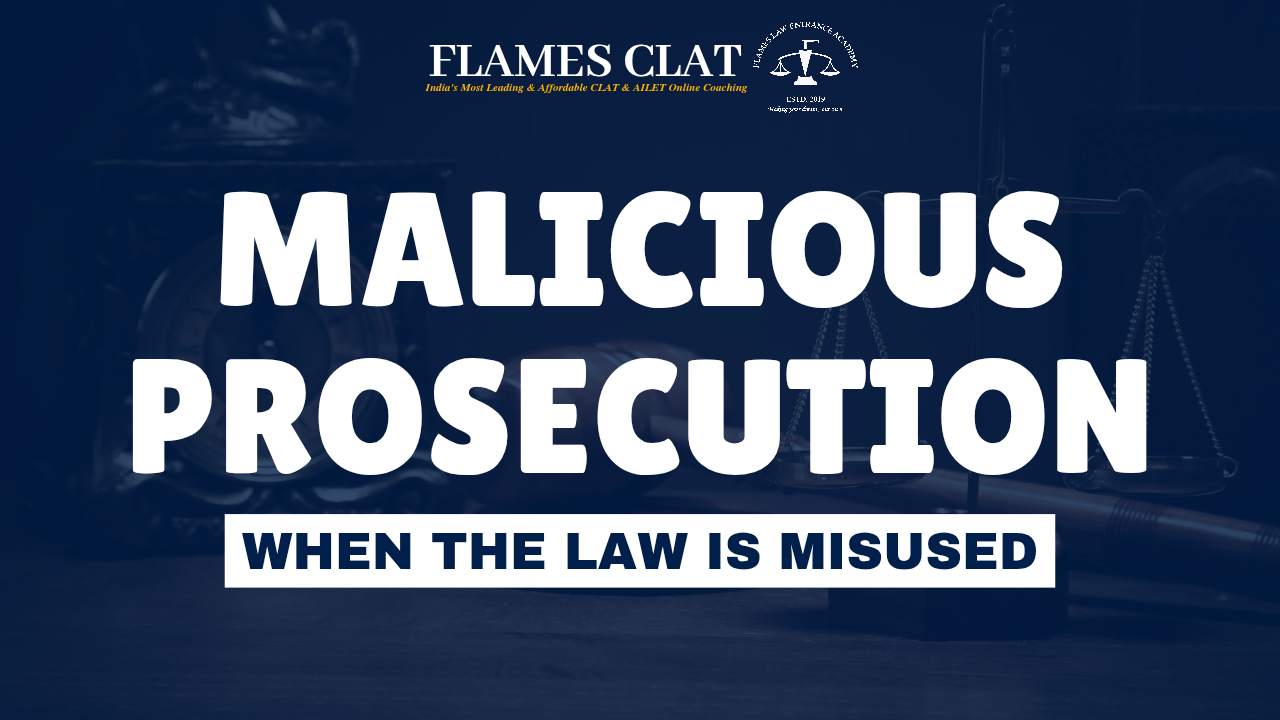Malicious Prosecution: When the Law Is Misused
Malicious Prosecution, which was originally made a shield, has become that weapon which is used to manipulate the legal system in a way to harass people and clear the grudges. Such real life concepts are not only important for the preparation of entrances like CLAT, AILET but also for exams like Judiciary. So, Flames CLAT makes the students understand these topics in much wider detail.
What is Malicious Prosecution?
Malicious prosecution is a situation when someone knowingly misuses the legal process in a way to trouble another person. It is when a person is being dragged to the court not because you did something wrong, but he wanted to harass you, damage your reputation or settle any grudges.
In simple words, malicious prosecution is a wrongful legal action brought with bad intentions, without any real case or evidence, and usually ends in favour of the victim.
Where Does It Come Under?
Malicious prosecution falls under the Law of Torts i.e. it is a civil wrong. It is not about punishing someone for a crime, but about compensating the person who has suffered due to someone's wrongful legal action.
In India, even though there is no statutory provision but courts recognize and protect victims of such legal misuse through principles derived from tort law and common law.
Essential Ingredients: What Must Be Proven?
The six essentials to prove a case of Malicious Prosecution:
- The prosecution was initiated by the defendant – That means the person being sued actually played a role in starting the legal process.
- It ended in favour of the plaintiff – The case must have been dismissed or the person must have been acquitted. If they were found guilty, then it is hard to claim they were wrongfully prosecuted.
- There was no reasonable or probable cause – The person who filed the case had no solid reason or evidence to back it.
- The defendant acted with malice – It was not a mistake or confusion. There was intent to harm or harass.
- The plaintiff suffered damage – It could be mental stress, loss of reputation, financial costs, or even wrongful imprisonment.
- The process was abused – The legal system was used not for justice, but for personal revenge.
These elements are not always easy to prove, which is why malicious prosecution cases are taken seriously and examined very carefully by courts.
Landmark Case: State of West Bengal v. D.K. Basu
In this famous case, the Supreme Court of India laid down clear guidelines on arrest and detention, which relate directly to malicious prosecution. The court emphasized that no person should be arrested without a valid reason, and police officers must follow due procedure established by law. Otherwise, they can be held personally responsible.
Cases like these show how the courts are careful not to let the legal system become a tool of oppression.
Why This Matters in CLAT and other law exams
For a CLAT aspirant, understanding malicious prosecution teaches you more than just legal theory. It shows you:
- How the judicial system protects the innocent.
- Why intent matters in law.
- How tort law balances rights and responsibilities.
At Flames CLAT, we explore such topics using real-life cases, class debates, and even role plays where students argue both sides. You learn not just to know the law but to question it, defend it, and use it responsibly.
Difference between Malicious Prosecution and False Imprisonment
Students often get confused between malicious prosecution with false imprisonment. There is a thin line difference between the two:
- False imprisonment is when someone is physically confined without lawful authority.
- Malicious prosecution is about being wrongfully dragged through the legal process, not necessarily imprisoned.
Both are torts, but they focus on different kinds of harm.
Conclusion
Law is meant to protect, not persecute. But when people twist it to serve their own interests, the courts step in and so does tort law. Malicious prosecution makes it very clear that justice is not just about facts; it is also about intention.
At Flames CLAT, we train students to spot this intent, to think critically, and to argue with both heart and reason. Because being a great lawyer is not about knowing every section, it is about knowing when the law is being used and when it is being misused.
Join our Flames CLAT Family at https://t.me/flamesclat
For Informative videos, do check out https://youtube.com/@flamesclat?si=-PqiaRLEjutM-iYj




Write a Review
Your email address will not be published. Required fields are marked *